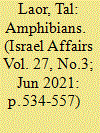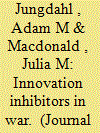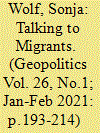| Srl | Item |
| 1 |
ID:
178304


|
|
|
|
|
| Summary/Abstract |
Digital platforms have become a major tool for media figures. The Internet offers the media essential tools, most notably authentic and accessible sources of information and the absence of censorship. Digital media provides media personalities with a platform that is free and fast where they can express themselves freely without ‘gatekeepers.’ Drawing on Deuze’s five-dimensional model of journalism, this article shows that for the content transfer platform, the network is characterised by a young audience, leading to more consumer confidence due to its authentic nature. It also found that platform selection relates directly to content and that media people use the network to promote agendas. In addition, their influence on social networks is greater because they are bi-directional and allow for audience reaction. As for the media figure’s personality, it was found that the success of media figures does not involve the quality of the content but the admiration of the audience. In addition, it emerged from the interviews that technological determinism affects media figure activities such that ‘the medium is the message’ – type of media dictates choice of the content transfer platform, content, and media figure personality.
|
|
|
|
|
|
|
|
|
|
|
|
|
|
|
|
| 2 |
ID:
138743


|
|
|
|
|
| Summary/Abstract |
What explains the pace at which militaries adopt new technology? We argue that the hierarchical structure and unique expertise requirements of military organizations combine to empower select individuals as ‘gatekeepers’ of innovation. These individuals acquire beliefs throughout their military careers regarding the nature and means of warfare that act to shape their attitudes towards new military innovations. By filtering, sidelining, and ignoring competing sources of advice and information, these officers actively inhibit the adoption of new, often advantageous, innovations. We develop this argument through the analysis of two cases: the delayed acquisition of breech-loading and repeating rifles by the Union Army during the American Civil War, and the failure of the US Army to adopt an adequate heavy-type tank in World War II.
|
|
|
|
|
|
|
|
|
|
|
|
|
|
|
|
| 3 |
ID:
179519


|
|
|
|
|
| Summary/Abstract |
Individuals and families are being displaced from the Northern Triangle of Central America by structural and physical violence. Clandestine migration increases the invisibility of forced migrants and makes them difficult to access for researchers. Gatekeepers perceive or depict forced migrants as vulnerable populations and often deny investigators access to them, arguing that traumatised people should not be asked to retell their stories and be revictimised. The growing literature on research participation suggests that individuals categorised as vulnerable often decide to collaborate in studies, because they welcome the opportunity to talk about their experience to an empathetic listener and to help improve policies and services. Immediate distress produced by revisiting painful moments in life often dissipates quickly and is outweighed by the benefits of research participation, such as feelings of catharsis and a sense of acknowledgement and purpose. When gatekeepers deny investigators access to vulnerable population groups, they preclude them from autonomously deciding whether to grant or withhold informed consent and from exercising their right to participate in research. Their invisibilities and silences render migrants more susceptible to human rights violations. Taking protection seriously means widening the research participation of vulnerable individuals.
|
|
|
|
|
|
|
|
|
|
|
|
|
|
|
|